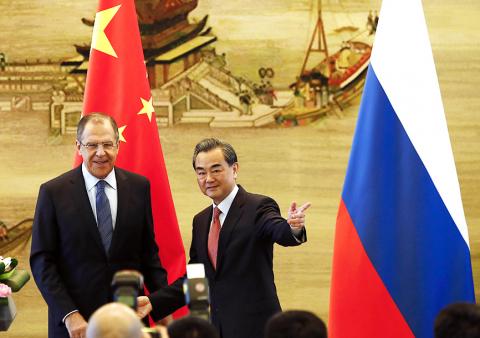China and Russia yesterday criticized US plans to put a missile defense system on the Korean Peninsula, less than 24 hours after Pyongyang twice tested rockets thought to be capable of reaching US territory.
A series of missile tests and nuclear blasts by North Korea have pushed Seoul into talks with Washington about deploying the US’ sophisticated Terminal High Altitude Area Defense System (THAAD), which fires projectiles to smash into enemy missiles.
Beijing fears that the presence of more US hardware on its doorstep would further tip the balance of power in the Pacific toward Washington.

Photo: EPA
“We both are gravely concerned about the US’ likely deployment of the THAAD system in South Korea,” Chinese Minister of Foreign Affairs Wang Yi (王毅) said at a briefing with Russian Minister of Foreign Affairs Sergei Lavrov.
“The move goes beyond the actual defense needs of relevant countries,” Wang said. “It will directly affect the strategic security of China and Russia respectively if it is deployed.”
Lavrov said Washington was using the North’s tests as “an excuse, as a pretext” to deploy what he called Washington’s “global antiballistic missile defense.”
This week’s North Korean rocket tests failed, but Pyongyang has now made three bids in two weeks to test-fly a Musudan missile, which is capable of striking US bases on the Pacific island of Guam.
“The current situation on the peninsula is indeed in a highly dangerous period,” Wang said.
He added that proper implementation of UN resolutions barring the North from developing any ballistic missile-related technology is key to bringing the country to the negotiating table.
China is the North’s biggest trading partner and its key aid provider.
South Korean military officials say the North is desperate to register a successful launch ahead of next week’s ruling party congress, at which North Korean leader Kim Jong-un is expected to take credit for pushing the country’s nuclear program to new heights.
In recent months, the North has claimed a series of major technical breakthroughs in developing what it sees as the ultimate goal of its nuclear drive — an intercontinental ballistic missile capable of delivering a warhead to targets across the continental US.
The achievements trumpeted by Pyongyang have included miniaturizing a nuclear warhead to fit on a missile, developing a warhead that can withstand atmospheric re-entry and building a solid-fuel missile engine.

NATIONAL SECURITY THREAT: An official said that Guan Guan’s comments had gone beyond the threshold of free speech, as she advocated for the destruction of the ROC China-born media influencer Guan Guan’s (關關) residency permit has been revoked for repeatedly posting pro-China content that threatens national security, the National Immigration Agency said yesterday. Guan Guan has said many controversial things in her videos posted to Douyin (抖音), including “the red flag will soon be painted all over Taiwan” and “Taiwan is an inseparable part of China,” while expressing hope for expedited “reunification.” The agency received multiple reports alleging that Guan Guan had advocated for armed reunification last year. After investigating, the agency last month issued a notice requiring her to appear and account for her actions. Guan Guan appeared as required,

A strong cold air mass is expected to arrive tonight, bringing a change in weather and a drop in temperature, the Central Weather Administration (CWA) said. The coldest time would be early on Thursday morning, with temperatures in some areas dipping as low as 8°C, it said. Daytime highs yesterday were 22°C to 24°C in northern and eastern Taiwan, and about 25°C to 28°C in the central and southern regions, it said. However, nighttime lows would dip to about 15°C to 16°C in central and northern Taiwan as well as the northeast, and 17°C to 19°C elsewhere, it said. Tropical Storm Nokaen, currently

‘NATO-PLUS’: ‘Our strategic partners in the Indo-Pacific are facing increasing aggression by the Chinese Communist Party,’ US Representative Rob Wittman said The US House of Representatives on Monday released its version of the Consolidated Appropriations Act, which includes US$1.15 billion to support security cooperation with Taiwan. The omnibus act, covering US$1.2 trillion of spending, allocates US$1 billion for the Taiwan Security Cooperation Initiative, as well as US$150 million for the replacement of defense articles and reimbursement of defense services provided to Taiwan. The fund allocations were based on the US National Defense Authorization Act for fiscal 2026 that was passed by the US Congress last month and authorized up to US$1 billion to the US Defense Security Cooperation Agency in support of the

PAPERS, PLEASE: The gang exploited the high value of the passports, selling them at inflated prices to Chinese buyers, who would treat them as ‘invisibility cloaks’ The Yilan District Court has handed four members of a syndicate prison terms ranging from one year and two months to two years and two months for their involvement in a scheme to purchase Taiwanese passports and resell them abroad at a massive markup. A Chinese human smuggling syndicate purchased Taiwanese passports through local criminal networks, exploiting the passports’ visa-free travel privileges to turn a profit of more than 20 times the original price, the court said. Such criminal organizations enable people to impersonate Taiwanese when entering and exiting Taiwan and other countries, undermining social order and the credibility of the nation’s